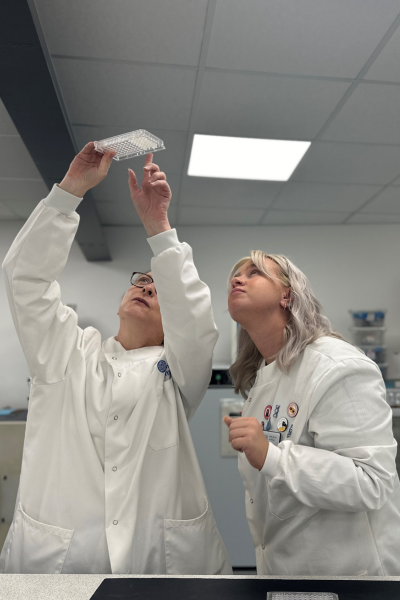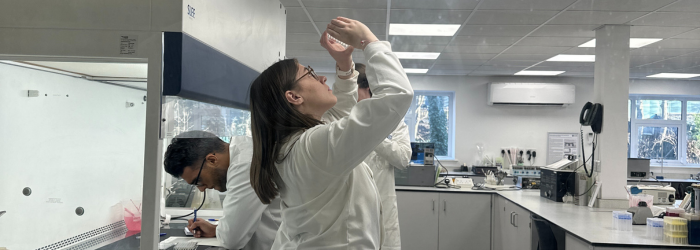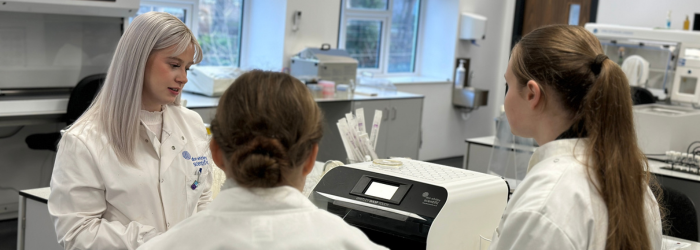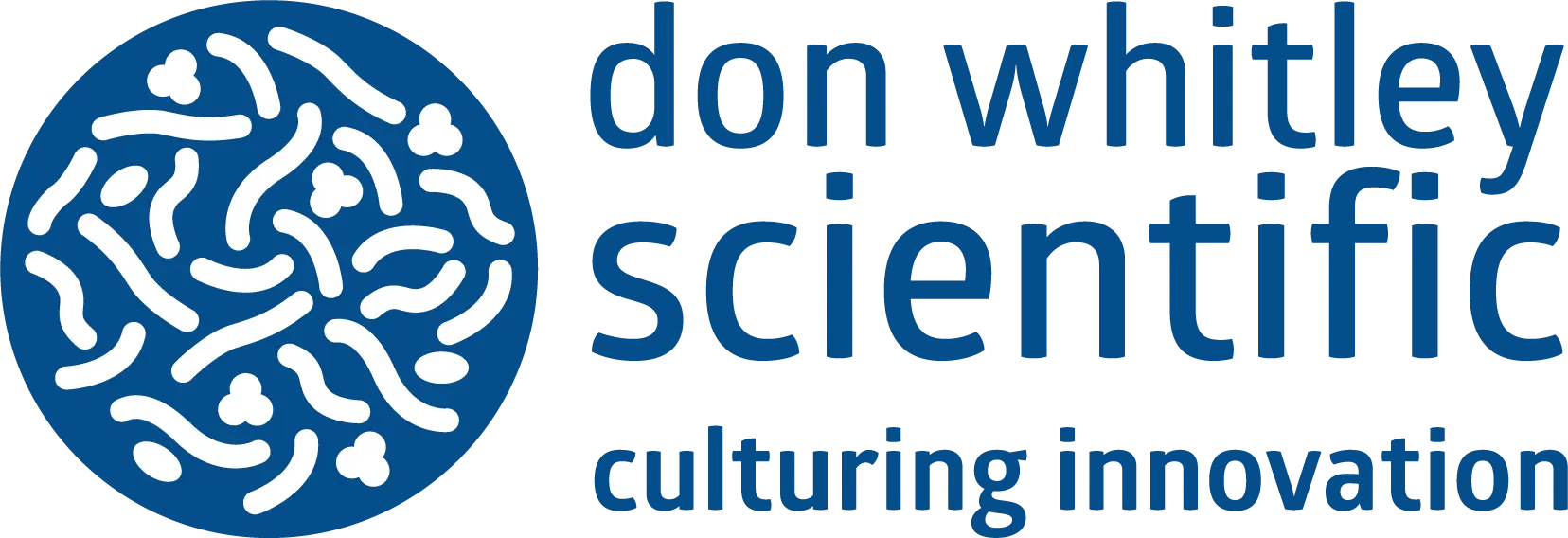
Dr Claire Wright, Lecturer in Medical Microbiology at York St John University, recently visited the Don Whitley Scientific (DWS) Contract Laboratory to collaborate with our microbiologists and expand her knowledge. During her visit, Claire had the opportunity to observe DWS microbiologist Kirsty McTear as she conducted broth microdilution Minimal Inhibitory Concentration (MIC) testing, a method Kirsty regularly performs in her role.
We sat down with Dr Wright to discuss her background, recent training with Kirsty, and the value of industry partnerships in microbiology education:
Background and Role at York St John University
Dr Wright’s journey into microbiology began with her undergraduate degree in Biomedical Science, where she specialised in microbiology and, notably, won the Don Whitley Scientific Prize for Microbiology in 2007. Reflecting on her early achievements, she fondly remembers receiving her award from Don Whitley himself.
Since joining York St John University in 2018, Dr Wright has been committed to nurturing students’ microbiology skills; “I lead across all levels of study in microbiology modules and enjoy embedding different discipline-specific laboratory skills throughout the program to give our students an excellent range of microbiology skills.”
Dr Wright’s research interest focuses on environmental microbiology, specifically species of human pathogens that inhabit water distribution systems that can infect vulnerable individuals such as cancer patients and burns patients. Her expertise directly benefits her students as she aims to prepare them for careers in microbiology by exposing them to diverse techniques and applications.
Hands-on Learning at DWSThe collaboration with DWS was a valuable opportunity for Dr Wright to refresh her MIC testing skills. “Laboratory science is a lot like speaking languages,” she shared. “If you don’t practice it often enough, you can forget it quite quickly!” Working with Kirsty allowed her to revise her skills and ensure they're in line with current industry standards. “Indeed, the standards had changed since I last performed MICs,” Dr Wright said, adding with humour, “I immediately went back to my lab and had a little play with the new protocol—I’m not too proud to say that a few test runs went in the bin!” This training has practical implications for her students as well, especially those working on microbiology projects. “I have some undergraduate dissertation research project students beginning their lab work in January. They will definitely be using MIC testing during their projects, and the training Kirsty gave me will be immediately practiced by this year’s group of final-year students.” |
 |
The Value of Industry-Academia Collaboration
For Dr Wright, partnerships like the one between York St John University and DWS are immensely beneficial to students and faculty alike. “There is a benefit to students from being exposed to real-world applications of the subjects they are studying. They get to take their theoretical classroom experience and see the demands for that knowledge in the industry and even more importantly, begin to picture themselves in it” she explained. This collaboration is equally valuable to her, providing “professional conversations and training that keeps my understanding of the sector and my laboratory practice current and at a high standard.”
Dr Wright recognises that industry collaborations as essential for enhancing microbiology education; “The job market for graduating students is tougher than ever, and a student who can demonstrate an understanding of an industrial sector will have a stronger CV,” she remarked. In addition to immediate educational benefits, she believes these partnerships can foster long-term innovation. “Collaborations between academics and specialist businesses can lead to innovations in products, services, and research. This training session was a perfect example of knowledge sharing and the benefits to both parties.”
A Shared Commitment to Knowledge and Sustainability
The experience has sparked inspiring discussions on both practical lab topics and broader issues. “We had a number of interesting conversations, ranging from laboratory-related topics to subjects like sustainability. We discussed the MIC protocol, the media and equipment we both use, and chatted briefly about some of our research interests. We also discussed sustainability and the impact of life sciences on the environment and the responsibilities we all share in mitigating the cost of our work where possible,” Dr Wright shared.
Looking forward, Dr Wright is excited to welcome DWS staff to York St John University, where they will once again share their insights with students. “In January, Kirsty and a colleague will visit YSJ to talk to our students about the exciting range of work done at DWS and the company’s aims for sustainability,” she said. “This is a valuable learning opportunity for students to realise the impact they will have as life scientists, both positive and negative, and their responsibilities as they build their careers.”
Dr Wright’s enthusiasm for knowledge sharing and skill-building reflects the strengths of academia-industry partnerships. Her collaboration with DWS reinforces the importance of continuous learning and adapting to the latest industry standards—a lesson she’s eager to pass on to the next generation of microbiologists. 
Insights from DWS Microbiologist Kirsty McTear
We also caught up with Kirsty, who reflected on the collaboration with Dr Wright:
“A huge thank you to Claire for trusting us to provide the refresher training she requested from the DWS Lab. During the session, we covered procedural essentials to give Claire the best foundation for her upcoming project, but it was also an opportunity for me to learn more about the current standards universities adhere to.
Working closely with academics helps companies like DWS stay updated on projects and future research we might otherwise miss. For instance, Dr Wright shared valuable insights about sustainability initiatives across various universities. As DWS is accredited to ISO 14001 for Environmental Management, this is an area we’re keen to explore further, given our strong commitment to environmental sustainability.
Our partnership has been mutually beneficial; we have hosted Claire’s students, who joined us for tours and lab practicals in the past, while I have visited York St John to deliver careers talks. It’s rewarding to know I am helping to inspire future generations of scientists. I look forward to our collaboration continuing with the same success as it has thus far.”
This perspective from Kirsty highlights the reciprocal benefits of academic and industry partnerships, fostering innovation, sustainability, and skill development across both fields.



 au
au


 English
English